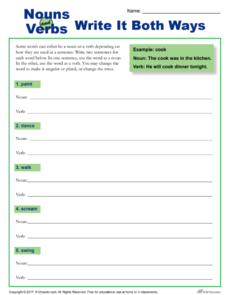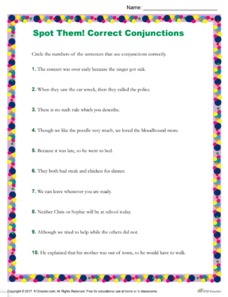K12 Reader
Guess a Noun
Can you figure it out? A activity challenges grammarians to read 28 descriptions and guess what noun each one is describing.
K12 Reader
Sentence Writing: Conjunctions!
You don't need to be a grammar fan to use FANBOYS correctly—but it helps! Practice using conjunctions with a word bank of common connecting words and eight sentence prompts.
K12 Reader
Conjunctions: Connecting Predicates
Forget walking and chewing gum—the subjects of these sentences can perform several actions at once! Practice connecting predicates with conjunctions in a helpful grammar activity.
K12 Reader
Conjunctions: Connecting Subjects
Having two subjects seems like it makes a sentence more complicated, but it's as easy as adding an extra conjunction! Connect subjects with eight sentences that are each missing an important and.
K12 Reader
Conjunctions: Connecting Modifiers
Practice grammar and come up with some great sentences! Language arts students find the missing and in each sentence with a worksheet that focuses on conjunctions.
K12 Reader
Correlating Conjunctions
A worksheet on correlating conjunctions could be used as either a check for comprehension or as a homework assignment. Whether or not conjunctions are their thing, the activity will not only engage young grammarians, but also teach them...
K12 Reader
Nouns Verbs: Write it Both Ways
A five-item activity challenges scholars to write two sentences using the same verb in two different ways—as a noun and a verb.
K12 Reader
Writing with Interjections
Challenge young writers to craft original sentences using interjections from a list provided on a colorful worksheet.
K12 Reader
Mild and Strong Interjections
Whew! This learning exercise is tough! Unless, of course, young grammarians know the difference between mild and strong interjections.
K12 Reader
Interjections in Dialogue: Tom Sawyer
Mark Twain is a master of using interjections in his dialogue. A grammar worksheet focused on interjections features the passage from The Adventures of Tom Sawyer in which Tom tricks Ben into taking on the job of whitewashing Aunt...
K12 Reader
Find the Interjection
Yikes! Young grammar sleuths must find the interjections that add the oomph to a series of sentences.
K12 Reader
Add an Interjection
Wow! Here's a worksheet about interjections! After reading a brief definition of this part of speech, young grammarians select an interjection from the provided word bank to add to a sentence.
K12 Reader
Which Is It: Subordinating or Coordinating Conjunction?
To demonstrate their understanding of the difference between subordinating and coordinating conjunctions, learners identify and label the conjunctions found in 10 sentences.
K12 Reader
Spot Them! Correct Conjunctions
Young grammarians demonstrate their understanding of conjunctions by identifying sentences on a short worksheet that use conjunctions correctly.
K12 Reader
Correcting Run-On Sentences: Commas and Conjunctions
Young grammarians learn how to correct run-on sentences by adding coordinating conjunctions and commas.
K12 Reader
Writing with Subordinating Conjunctions
Challenge young grammarians to turn sets of phrases into sentences by adding subordinating conjunctions on a short learning exercise.
K12 Reader
Change the Verbs to Adverbs
A 10-item worksheet challenges scholars to change verbs to adverbs using their knowledge of adjectives and suffixes.
K12 Reader
Identifying Conjunctive Adverbs
Conjunctive adverbs can connect two independent clauses like grammar magic! A short review activity prompts students to find and circle the conjunctive adverbs in each sentence.
K12 Reader
Conjunctive Adverbs and Independent Clauses
Conjunctive adverbs are not conjunctions, but they can function as conjunctions when paired with appropriate punctuation. If that's too complicated for language arts students, have them work on an activity that provides a word bank of...
K12 Reader
Progressive Story: Adverb Clauses
Adverb phrases add a lot to a sentence, but they cannot stand alone. A fill-in-the-blank worksheet provides spaces for learners to add adverb phrases that add meaning to the independent clause of each sentence.
Perfection Learning
In The Year of the Boar and Jackie Robinson - Activity Book
Moving to a new country isn't easy, as Shirley Temple Wong learns in In The Year of the Boar and Jackie Robinson by Bette Bao Lord. A series of language arts activities carry readers through the novel, addressing the story's themes,...
Lord Fairfax Community College
Pronoun-Antecedent Agreement Worksheet
It's often hard for people to see eye to eye, but it's easy to get pronouns and their antecedents to agree! Practice changing subjective and objective pronouns to agree with their nouns with ten different sentences.
K12 Reader
Nouns: Deck the Halls!
Fa la la! Join the holiday fun by asking young lads and lasses to identify the nouns in the holiday classic, "Deck the Halls!" Sure to be a Yuletide treasure.
Rosetta Stone
Absolute Possessive Pronouns
Pronouns are meant to replace nouns in a sentence, but don't replace this resource so easily! A collection of worksheets challenges young grammarians with fill-in-the-blanks, word searches, and sentence diagramming.

























